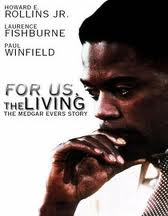
FOR US, THE LIVING
US, 1988, 84 minutes, Colour.
Howard E.Rollins, Rocky Acki, Irene Cara, Paul Winfield, Roscoe Lee Browne, Larry Fishburne, Margaret Avery.
Directed by Michael A. Schultz.
For Us, The Living is a fine tribute to civil rights activist Medger Evers, assassinated in 1963. The film offers us a flashback, narrated by Evers' wife Myrlie who acted as a consultant for the film. She looks back at the ten years leading up to the death of her husband and the progress of civil rights in Mississippi. (The film is interesting to compare with Mississippi Burning with its emphasis on the white FBI agents in contrast with the work of blacks themselves; the telemovie Murder in Mississippi also the same story as Mississippi Burning but focuses on the white and black victims in 1964. The issues were also examined in Rob Reiner's Ghosts of Mississippi with Whoopi Goldberg appearing as Myrlie Evers.)
Howard Rollins is effective as Medger Evers. He had appeared in Ragtime, A Soldier's Story and was the lead in the television version of In the Heat of the Night. Singer Irene Cara is his wife. Supporting cast includes veterans Paul Winfield as the negro who tries to ingratiate himself with the whites, Roscoe Lee Brown as the New York representative of the NAACP, Larry Fishburn as an active young black.
The film idealises Evers and presents him as almost without fault, a sincere family man, loving wife and children, dedicated to his work. To this extent the film is an inspirational biography rather than a realistic one. However, it is nonetheless effective for its idealism. The film was directed by Michael Schultz, the black director of such movies as Car Wash, Carbon Copy, Greased Lightning.
1.The impact of the film? For American audiences? White and black? For non-American audiences? Insight into the United States? Racial tensions and racism? Civil rights?
2.The film as a Public Broadcasting Service telemovie - quality of production, audience intended? Impact?
3.The title, the dead Evers and the other slain civil rights advocates? Those who survive as inheriting the benefit of their work?
4.The opening with 1963: civil rights, John F. Kennedy and his speech, the Constitution, the appeal to the American people? The history of civil rights to that time? The significance of 1963 in United States social history? The family listening to the broadcast, Evers arriving home, his being shot? The film coming again at the end to the assassination, replaying it? The funeral, Myrlie Evers' speech and grief, the bequest of Evers' campaigns?
5.1953 to 1963, Mississippi, the tradition of prejudice, the lives of the negroes, subservience, fear? The power of the whites? The episode with Medger trying to sell insurance, introduce the NAACP - and the hostile white man with his gun? The effect on Evers?
6.Myrlie and the children, her not wanting him to be in such danger? Their clash? His taking the position in Jackson? Her going to her parents, her mother's wisdom, urging her to be with him? The white men in the car, drinking and molesting the parents, the rescue by Medger? The impact on the family?
7.The NAACP in Mississippi, the appeal for the signatures about integrating schools? Evers as a campaigner, persuasive, with people? The meeting, the old man asking the questions, he and his wife signing? The other people signing up? The presentation of the petition and its rejection? The violence, the deaths, jobs lost, houses burnt, bank foreclosures? The NAACP and their providing money? The fight back?
8.The racial attitudes in Mississippi, the whites and their meetings, the bigotry, behaviour? The blacks in the library and the reactions? Sheriffs? The witness to the murder - and yet the white jury acquitting the white defendants?
9.The role of the negroes in the period, the portrait of Medger Evers as a person, sincerity, appeal to people? Concern? Control and strategies? The young people, the demonstration, with the authorities? With Current and the NAACP? With Sampson and the appeasers? The support of Myrlie? The children and their wanting to be part of the demonstrations?
10.Current, his support from New York, introducing Evers, getting the money? The contrast with Sampson, meeting with the white bigots, accommodating the governor, making the appeal to the negroes? Their rejection of his tactics?
11.The achievement of Medger Evers, the work of the late '50s, integration, schools, libraries, universities? The courage of the people against odds? Not feeling sorry for themselves, pride and self-assertion, equality? The inherent risk, the final violence?
12.A portrait of a period, civil rights and protest, violence, racism, yet achievement?